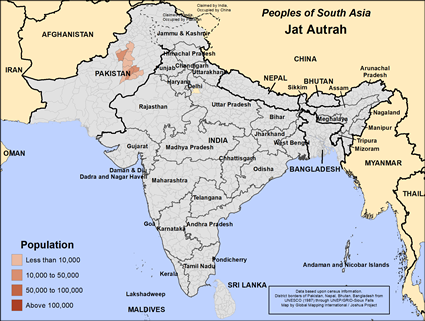Autrah is a Muslim Jat gotra (clan or lineage) living in Pakistan. There are different opinions as to the origin of the Jats, but most seem to recognize them to be from Indo-Aryan tribes native to the Punjab region that straddles modern Pakistan and India. There is a theory suggesting that they may be the predecessors of Gypsies. They probably reached Egypt with the Muslim conquerors, lived in Afghanistan before the Muslims, and invaded China with the Mongol Army. They also proved to be a threat to Tamarlane in Persia and Uzbekistan in the 1400s.
There are very few records concerning Jats prior to the 1600s. They rose to prominence following the 1669 Jat uprising against Mughal rule, and they ruled various princely states throughout the 18th century. For centuries the Jat lifestyle was designed to foster a martial spirit. Whenever they lost their kingdoms, Jat people became landlords who were ready to defend their land against any invaders.
After 1858, under the British Raj, the Jats were known for their service in the Indian Army, being categorized as a "martial race" by the British. For a couple hundred years Jats were a force that could not be ignored by South Asians or British imperialists.
Muslim Jat communities like the Autrahs are usually from Pakistan's Punjab Province, but they can also live in other provinces as well. You can easily find them in Punjab's Muzaffargarh district.
Autrah Jats have a very good self-image. "Men may come and men may go, but I go on forever," is a well-known Jat proverb. They are brave, hardworking people who possess both the desire and ability to rule. It has been said that no Jat wants to be ruled. Rather, he desires to have power over a group if not over an area. They take great pride in their ancestry. In fact, all the Jats in a particular village consider themselves to be the descendants of the man whom they believe founded it by the power of the sword.
Conservative by nature, the Jats rarely marry people from other people groups. From about 1650 AD onwards marrying within same clan became more common. The modern-day litmus test that Jat people use in marriage is if the girl and boy must not have the same great-great-grandparents (not related for four generations). If they are from the same clan but are not directly related for four generations then it is considered acceptable for them to marry.
Physically, the Jats are usually taller and heavier than most of their neighbors. Because of their larger build, their reputation for violence, and the fact that they control much of the land and village income, they are generally feared by other communities.
Most of the Jats live in rural areas, and they are usually landowners. A small percentage are traders and laborers. Today, the Jats are well read, and some occupy high positions in academic and technical arenas.
Though Jats were all originally Hindu, some Jat clans have converted to Islam. Most of these Islamic Jats trace their conversion to Sufi saints like Baba Fariduddin Ganjshakar in the 12th century. Muslim Jats have their own culture, which includes poems, songs, and stories of romance.
Though the Muslim Jats are Sunnis, they are known to have a strong tradition of worshiping many local saints. Jats observe many ceremonies, especially rites of passage such as circumcision and initiation into adulthood. Like many other South Asian communities of good standing, Muslim Autrah Jats have a negative view of Christianity, because it is associated with people of low status and caste.
Many Jat communities need clean drinking water and proper health care facilities. Christian medical teams and humanitarian aid workers are needed to work among them and show them God's love in practical ways.
Missionaries, Christian broadcasts, and evangelistic literature are needed to effectively reach the Jats with the light of the gospel. Most importantly, they need people who will begin to intercede for them, tearing down the strongholds that are keeping them in spiritual bondage. Only then will their hearts be prepared to receive the good news as it is presented to them.
Ask the Lord to send out more laborers to work among the Muslim Autrah Jats.
Pray that Christian doctors, nurses, and humanitarian aid workers will have opportunities to share the love of Jesus with the Autrah Jats.
Ask God to save key Jat leaders who will boldly proclaim the gospel to their own people.
Pray that churches and mission organizations will accept the challenge of adopting and reaching the Autrah Jats.
Ask God to raise up teams of intercessors who will faithfully stand in the gap for the Autrah Jats.
Pray for a disciple making movement to emerge among every Jat clan and community.
Scripture Prayers for the Jat Autrah in Pakistan.
https://joshuaproject.net/people_groups/20032/PK
https://www.jatland.com/home/Autrah
https://en.wikipedia.org/wiki/Jat_people
http://www.dawn.com/news/1077113
https://www.jatland.com/home/Jats
https://joshuaproject.net/people_groups/12329/IN
https://www.britannica.com/topic/Jat
http://www.dawn.com/news/1077113
https://www.jatland.com/home/Jats
https://joshuaproject.net/people_groups/18777/IN
https://joshuaproject.net/people_groups/17571/IN
| Profile Source: Keith Carey |











